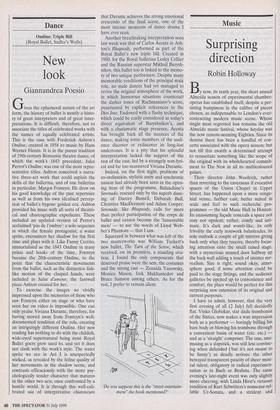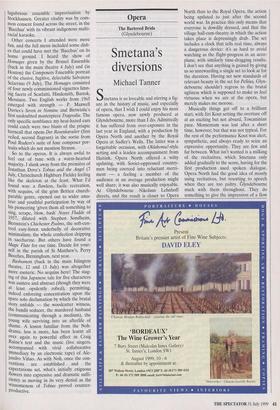Music
Surprising direction
Robin Holloway
By now, its tenth year, the short annual Almeida season of experimental chamber- operas has established itself, despite a per- sisting bumpiness in the calibre of pieces chosen, as indispensable to London's ever- contracting modern music scene. Whose single most regretted loss remains the old Almeida music festival, whose heyday was the now remote-seeming Eighties. Since its demise there has been a handful of con- certs associated with the opera season; but not till this month a determined attempt to resuscitate something like the scope of the original with its wholehearted commit- ment to The New in all its multicoloured guises.
Their director John Woolrich, rather than reverting to the cavernous if evocative spaces of the Union Chapel in Upper Street, has happened upon a more conge- nial venue, further east, better suited in scale and feel to such recherché pro- grammes — the old Music Hall in Hoxton. Its unassuming façade conceals a space not cosy nor opulent; rather, comfy and inti- mate. It's dark and womb-like, its only frivolity the curly ironwork balustrades, its sole outlook a couple of gilt mirrors giving back only what they receive, thereby focus- ing attention onto the small raised stage, with a mysterious unused door halfway up the back wall adding a touch of sinister sur- realism. Size is right, sound okay, atmo- sphere good; if some attention could be paid to the stage fittings, and the audience galleries be opened up to convenience and comfort, the place would be perfect for this surprising new extension of its original and current purposes.
I have to admit, however, that the very first evening of all (2 July) fell decidedly flat. Vinko Globokar, star dada trombonist of the Sixties, now makes a wan impression both as a performer — boringly biffing his bare body or blowing his trombone through a convenient basin of water (etc. etc.) and as a 'straight' composer. The one, una- • musing as a slapstick, was still less convinc- ing when defended (`but it's not meant to be funny') as deadly serious: the other betrayed transparent paucity of sheer musi- cal talent, obligatory in radical experimen- tation as in Bach or Brahms. The same evening's late-night event was only slightly more cheering, with Linda Hirst's virtuoso rendition of Kurt Schwitters's nonsense-syl- lable Ur-Sonata, and a strident and lugubrious ensemble improvisation by Stockhausen. Greater vitality was by com- mon consent found across the street, in the `Bacchus' with its vibrant indigenous multi- racial karaoke.
Other concerts I attended were more fun, and the full menu included some dish- es that could have met the 'Bacchus' on its home ground. I heard the show of Homages given by the Brunel Ensemble (back in the main theatre 4 July) and (in Hoxton) the Composers Ensemble portrait of the elusive, fugitive, delectable Salvatore Sciarrino (9 July). The Homages consisted of four newly commissioned vignettes limn- ing facets of Scarlatti, Hindemith, Bartok, Messiaen. Two English works from 1965 emerged with strength — P. Maxwell Davies's Seven in Nomine and Birtwistle's first undoubted masterpiece Trageodia. The only specific semblance my heat-hazed ears could catch were two blasts of the priapic horncall that opens Der Rosenkavalier (first veiled, second flagrant) in the sortie from Pout Ruders's suite of four composer por- traits which .do not mention Strauss.
So to the operas. It is always awful to feel out of tune with a warm-hearted majority. I slunk away from the premiere of Jonathan Dove's Tobias and the Angel (7 July, Christchurch Highbury Fields) feeling like the skeleton at the feast. What I'd found was: a flawless, facile recreation, with sequins, of the grim Britten church- parable genre, opened out to wider ama- teur and youthful participation by way of his pioneering 'given them all something to sing, scrape, blow, bash' Noyes Fludde of 1957, diluted with Stephen Sondheim, Bernstein's Chichester Psalms, the soft-cen- tred easy-listen underbelly of decorative minimalism; the whole confection dripping in saccharine. But others have found a Magic Flute for our time. Decide for your- self in the parish of St Matthew's, Perry Beeches, Birmingham, next year.
Rashomon (back in the main Islington theatre, 12 and 13 July) was altogether more esoteric. No sequins here! The stag- ing of this Japanese tale for five characters was austere and abstract (though they were at least opulently robed), permitting, indeed enforcing concentration upon the spare solo declamation by which the brutal story unfolds — the woodcutter witness, the bandit seducer, the murdered husband (communicating through a medium), the young wife surviving into an afterlife of shame. A lesson familiar from the Noh- drama, less is more, has been learnt all over again to powerful effect in Craig Raine's text and the music (live singers, accompanied with vivid collaborative immediacy by an electronic tape) of Ale- jandro Viiaao. As with Noh, once the con- ventions are established and the expectations set, what's initially exiguous flowers into expressive and dramatic suffi- ciency as moving in its very denial as the winsomeness of Tobias proved counter- productive.



























































 Previous page
Previous page